This page provides a selected overview of Philips solutions with AI functions and features.
Diagnosis and treatment
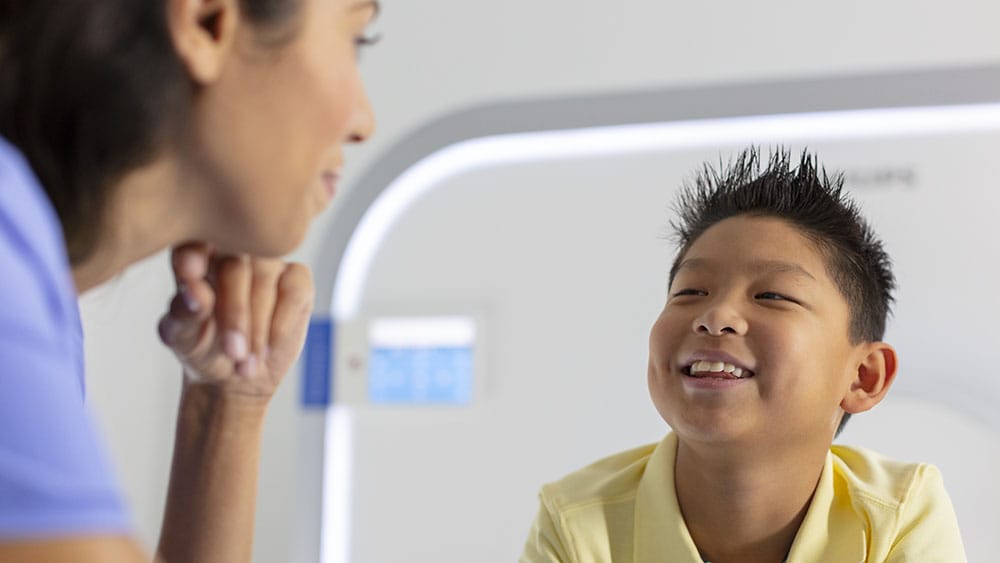
CT Precise Image
Precise Image is our advanced CT reconstruction technique designed to simultaneously reduce dose, lower noise, and improve low-contrast detectability with fast reconstruction speed that fits seamlessly in customers’ day-to-day operations.
AI-enabled function or feature Precise Image applied a supervised learning process and uses convolutional neural networks to reproduce the CT image appearance traditionally associated with high-dose filtered back-projection reconstruction. Validation Precise Image was validated by a global team of internal clinical specialists and external board-certified radiologists using clinical images across different anatomies and patient morphologies. Diagnostic confidence was evaluated using multiple image quality parameters, including sharpness, noise level, image texture, and artifacts. Ultimate decision responsibility Healthcare professionals remain in control of CT imaging, with the ability to apply and modify the strength of Precise Image.
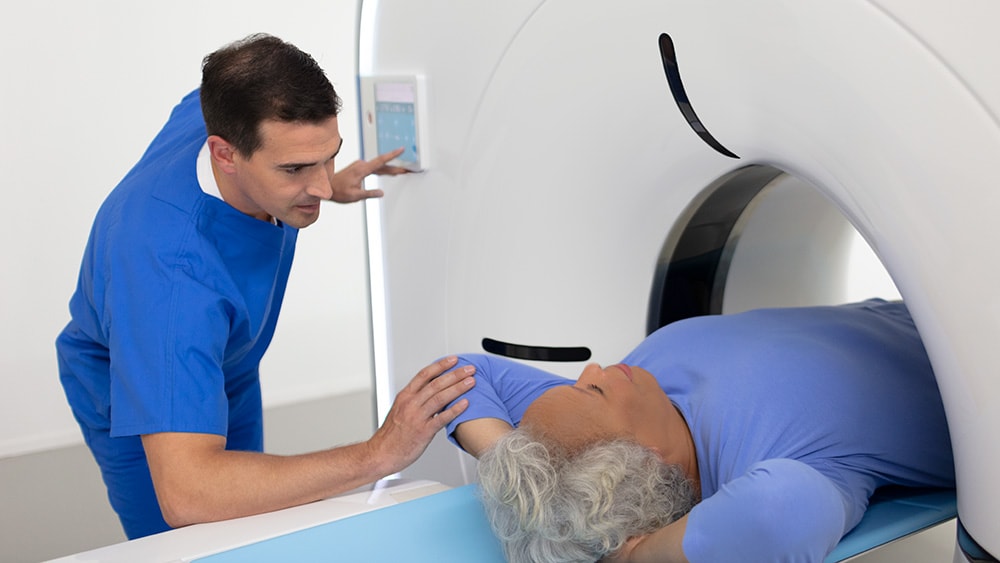
CT Precise Position
Precise Position is our camera-based solution to help streamline CT examination workflow. Precise Position is designed to improve vertical accuracy, improve inter-operator consistency, and reduce time of patient positioning.
AI-enabled function or feature Precise Position utilizes convolutional neural network technology to identify anatomical landmarks of patient anatomy, thereby recognizing the position of the patient on the CT table and automatically positioning the patient at isocenter. Validation The Precise Position algorithm and supporting workflow were validated using non-clinical and clinical performance testing with human body CT phantoms and volunteers by a global team of internal clinical specialists. Ultimate decision responsibility Healthcare professionals remain in control of CT patient positioning and imaging, with the ability to modify patient positioning.
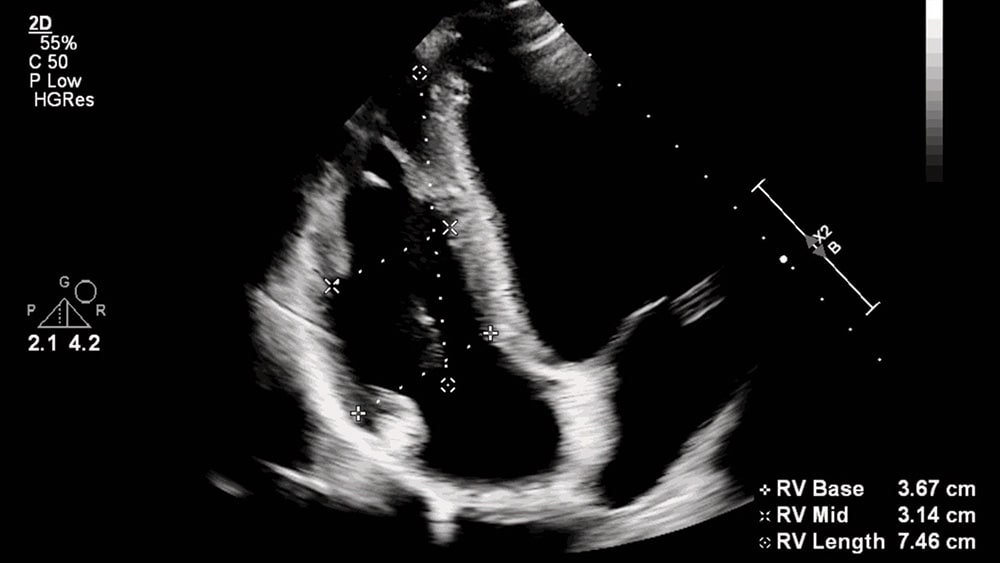
EPIQ CVx and Affiniti CVx with Auto Measure
Auto Measure on the EPIQ and Affiniti CVx Ultrasound systems assists users in completing routine cardiac measurements.
AI-enabled function or feature Auto Measure uses AI to automate the frame selection and caliper positions for standard 2D Echo and Doppler measurements that are performed during a diagnostic ultrasound exam. This allows for fast and reproducible echocardiographic measurements directly on the ultrasound system. Validation process Auto Measure was validated on a patient population acquired from multiple sites and geographies. The data covered a range of heart sizes and function. Ultimate decision responsibility Auto Measure is embedded in the standard measurement workflow, allowing healthcare professionals to accept or modify the results based on their clinical assessment.
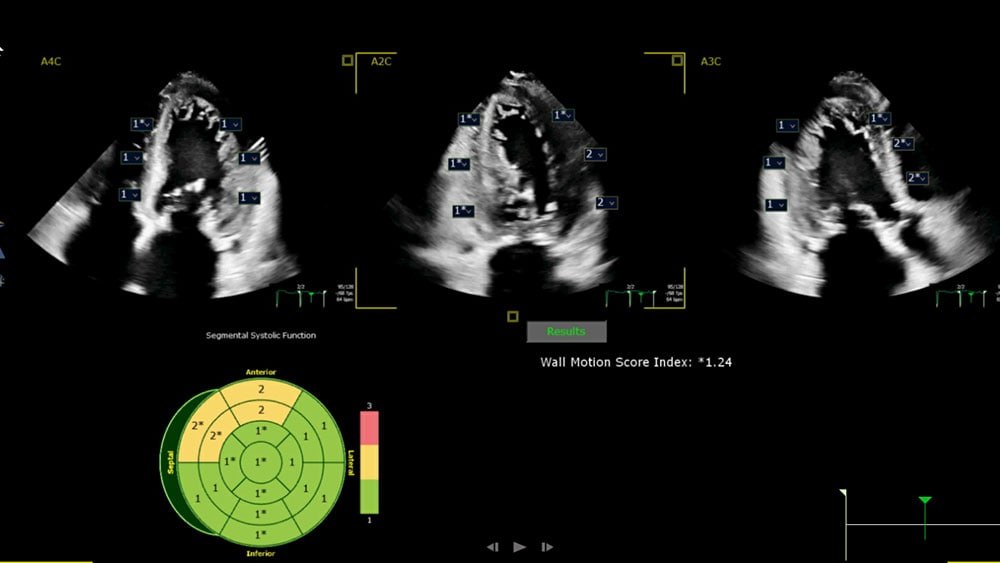
EPIQ CVx and Affiniti CVx with Segmental Wall Motion
Segmental Wall Motion provides an evaluation of wall motion in a standard 17-segment bullseye display to aid objective left ventricle wall assessment.
AI-enabled function or feature Segmental Wall Motion uses AI/Machine Learning to provide as assessment of wall motion for each of the 17 segments of the left ventricle, as defined using standard American Society of Echocardiography guidelines. Validation process Segmental Wall Motion was validated on patients’ data acquired from multiple sites and geographies. This data includes a variety of heart sizes and functions. Ultimate decision responsibility Healthcare professionals remain in control of the clinical assessment, while Segmental Wall Motion supports their workflow with automatically generated measurements.
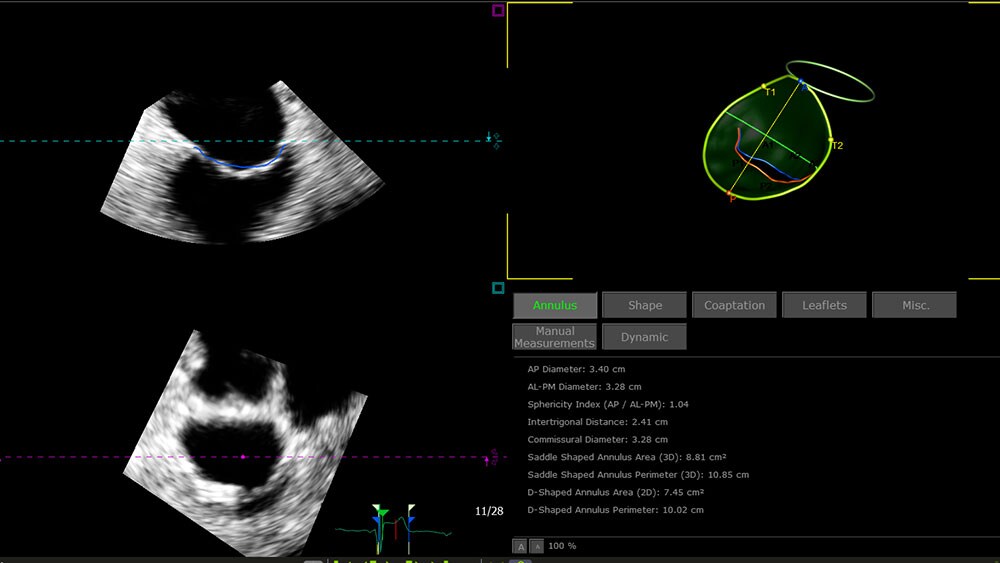
EPIQ CVx and CVxi with 3D Auto MV
3D Auto MV helps to analyze the complex anatomy of the mitral valve in 3D as well as its dynamic mechanics in systole. The mitral valve anatomy and topology are visualized with a comprehensive static and dynamic model.
AI-enabled function or feature 3D Auto MV uses anatomical models to provide semi-automated measurements of mitral valve annulus and leaflet morphology. Validation process 3D Auto MV was clinically validated on a typical patient population whose cardiac images covered a range of heart sizes and image quality. Ultimate decision responsibility Healthcare professionals remain in control of the clinical assessment, while 3D Auto MV supports their workflow with automatically generated measurements.
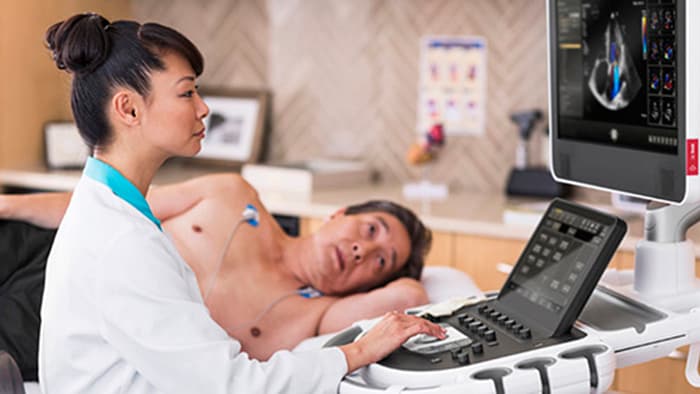
EPIQ CVx and CVxi with 3D Auto RV
The EPIQ CVx and CVxi are cardiac ultrasound solutions for diagnostic and interventional echo exams across a wide range of patients.
AI-enabled function or feature 3D Auto RV uses anatomical models to provide semi-automated measurements for right ventricle volume, ejection fraction, and other relevant calculations for cardiac anatomical and functional quantification. The parameters for the models were trained using AI technologies. Validation process 3D AutoRV was clinically validated on a typical patient population whose cardiac images covered a range of heart sizes and image quality. Ultimate decision responsibility Healthcare professionals remain in control of the clinical assessment, while 3D AutoRV supports their workflow with automatically generated measurements.
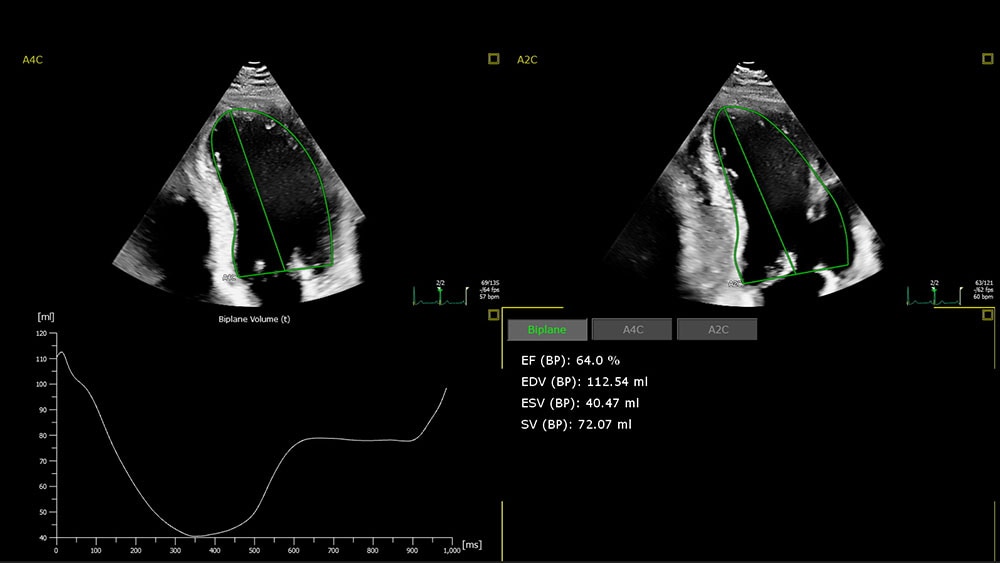
EPIQ CVx and CVxi with Auto EF
Automated Ejection Fraction (Auto EF) is designed to reduce variability in the calculation of ejection fraction from 4CH and/or 2CH views and Biplane and improve efficiency through automation. It allows users to assess cardiac function by any clinician, with all levels of experience with qualitative assessment.
AI-enabled function or feature Auto EF provides automated biplane Simpson EF measurements. Validation process Auto EF was clinically validated on a typical patient population whose cardiac images covered a range of heart sizes and image quality. Ultimate decision responsibility Healthcare professionals remain in control of the clinical assessment, while Auto EF supports their workflow with automatically generated measurements.
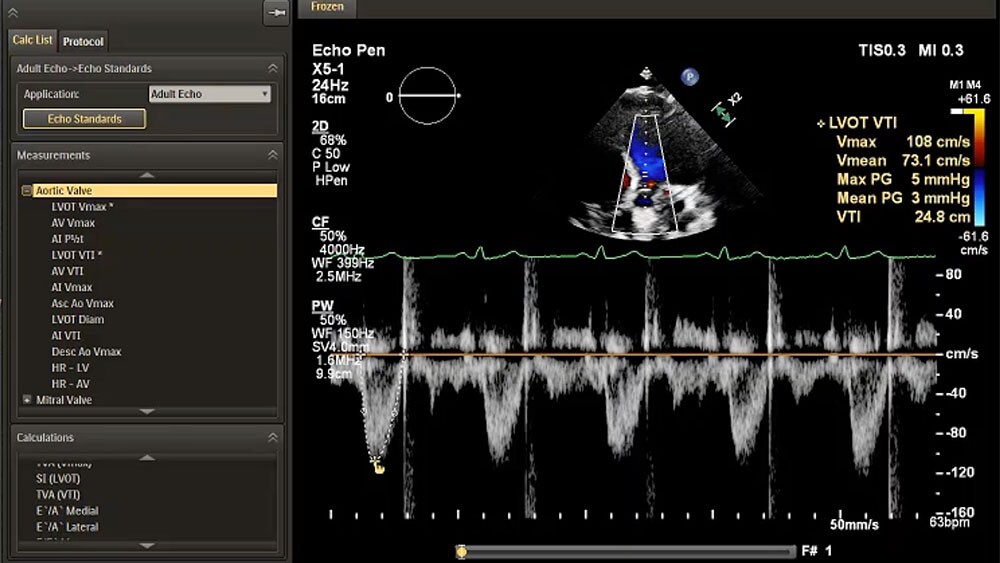
EPIQ CVx and CVxi with Smart Doppler View ID
Smart Doppler View ID is a workflow enhancement feature that automatically selects the calculation package group from the touchscreen for the user.
AI-enabled function or feature Smart Doppler View ID uses AI to classify major Doppler flow profiles acquired by a user. The Doppler Calculation Package Groups included are: Aortic Valve, Mitral Valve, Tricuspid Valve, Pulmonic Valve, Venous Flow, and TDI Vel & Ratio. Validation process Smart Doppler View ID was validated on a patient population acquired from multiple sites and geographies. The data covered a range of heart sizes and function. Ultimate decision responsibility Smart Doppler View ID is embedded in the standard measurement workflow, allowing healthcare professionals to accept or modify the selection of the calculation package with a single button push.
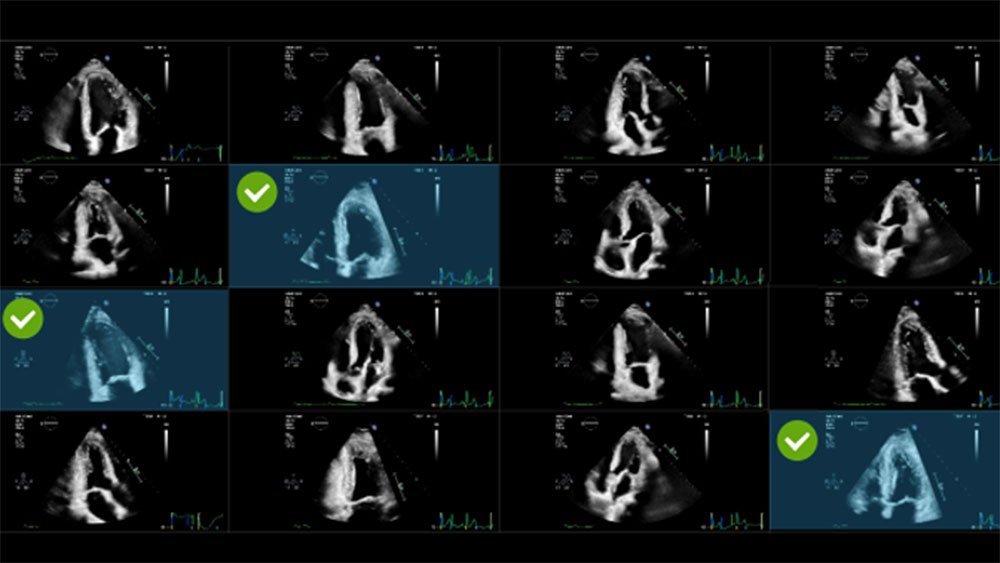
EPIQ CVx and CVxi with Smart View Select
Smart View Select recognizes, qualifies, and selects triplet of apical views that are the most suitable for analysis.
AI-enabled function or feature Smart View Select recognizes the acquired images after the acquisition of each clip, qualifies the apical views, selects the most suitable A4C, A2C and A3C according to their quality probability, range of depth of acquisition, and support the user with automatic or manual analysis in Auto Ef, Auto Strain and Segmental Wall Motion. It allows immediate response to the user during the echocardiographic acquisition and measurements, directly on the EPIQ ultrasound system. Validation process Smart View Select was validated on patients’ data acquired from multiple sites and geographies. This data includes a variety of heart sizes and functions. Ultimate decision responsibility Smart View Select is seamlessly integrated into the EPIQ platform as part of the user’s workflow, automating the images’ selection and supporting the user during the patient assessment process.
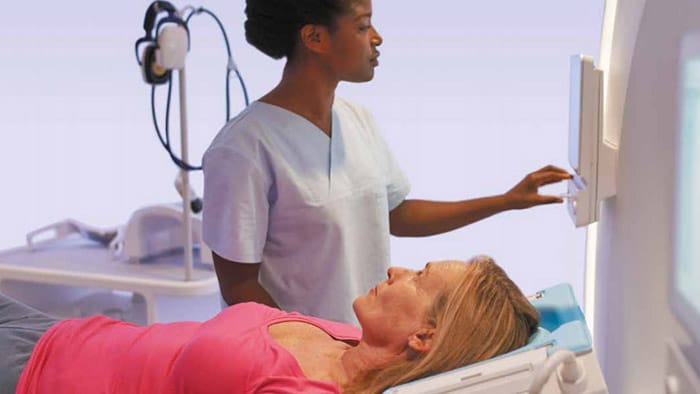
Ingenia Ambition X 1.5T MR with BlueSeal Magnet
The Ingenia Ambition X 1.5T MR with BlueSeal Magnet is the world's first MR system to enable helium-free operations.
AI-enabled function or feature BlueSeal is a fully sealed magnet that is designed to simplify MR installation, reduce lengthy and costly disruptions in MR services, and help the radiology department transition to sustainable helium-free operations. AI was incorporated into the magnet controls to enable a more efficient return to normal operations should an interruption occur. Validation process BlueSeal AI-enabled algorithms were validated using non-clinical performance testing. Ultimate decision responsibility Healthcare professionals remain in control of the radiology examination, while BlueSeal AI-enabled magnet controls enable a more efficient return to normal operations should an interruption occur.
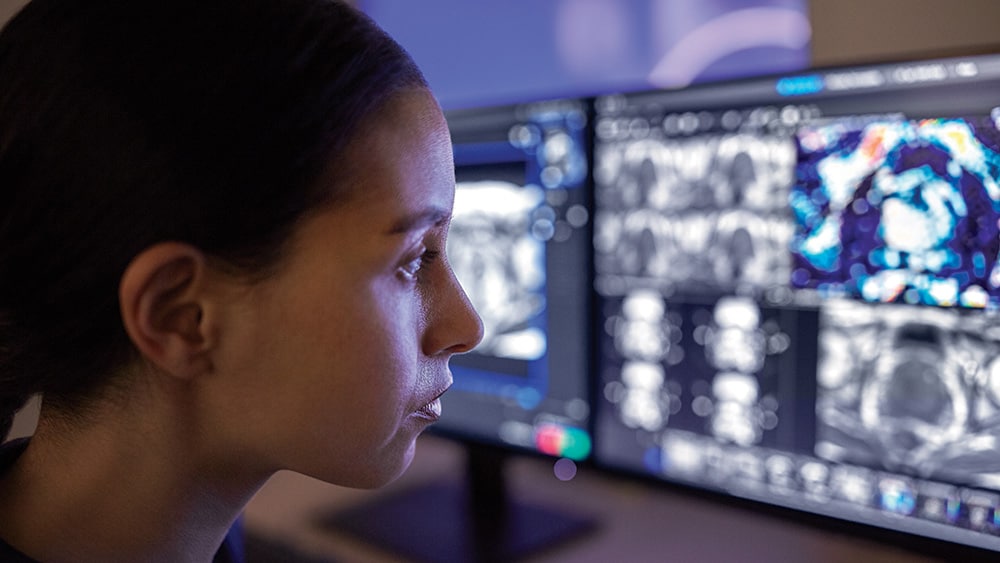
MR AI Protocol Assistant
MR Day Manager’s Protocol Assistant, part of the MR Workspace solution, helps MR technologists select the most appropriate protocol for any given MR examination and patient anatomy, by recognizing their preferred protocols for each clinical indication.
AI-enabled function or feature AI Protocol Assistant uses machine learning to automatically suggest a protocol for each exam. Learning from each hospital’s specific preferences, AI Protocol Assistant can reduce the time spent searching for protocols and may help in reducing errors in protocol selection. Validation AI Protocol Assistant has been validated with a Radiology Information System (RIS) simulator, demonstrating that suggested protocols typically match the actual RIS procedure codes that have been used. Ultimate decision responsibility AI Protocol Assistant suggests the most suitable protocol, but the user has multiple mechanisms of overruling the suggestion; either by design in the settings or in the user interface by disregarding the suggestion and selecting an alternative protocol.
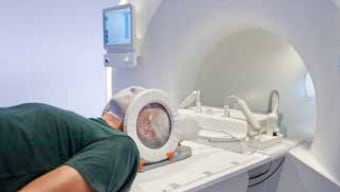
MRCAT
MRCAT Brain and MRCAT Head and Neck are software options for the Ingenia MR-Radiation Therapy simulation platform, which enables MR-based radiotherapy planning for tumors in the head, neck and brain without the need for CT.
AI-enabled function or feature MRCAT uses models trained with AI for the fast computation of continuous Hounsfield Units, based on a single MR scan and directly on the MR console, thereby providing detailed anatomical information for contouring and attenuation maps for dose calculation. Validation process MRCAT was validated using non-clinical performance testing with imaging data from patients referred to radiotherapy. Ultimate decision responsibility Healthcare professionals remain in control of the MRI imaging, and responsible for the radiation therapy plan.
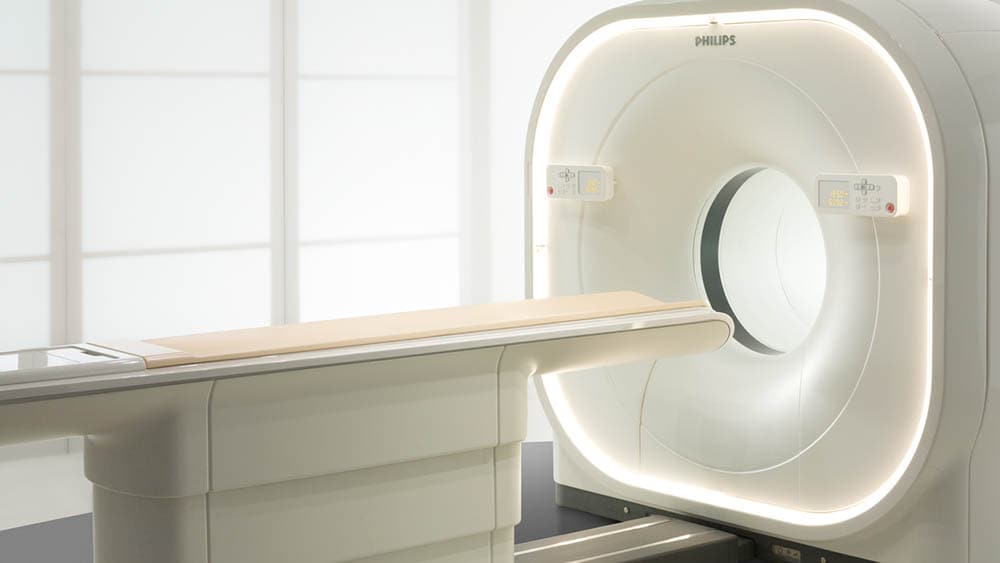
PET/CT Adaptive Reconstruction
Adaptive Reconstruction offers an AI-based smart processing of PET data during reconstruction to reduce image noise and enhance image contrast, resulting in improved image quality.
AI-enabled function or feature AI-based smart processing is derived from machine learning and neural network algorithms. Validation Machine learning was used in developing look-up tables for automated selection of PET reconstruction algorithm parameters, with resulting images validated by nuclear medicine experts. Ultimate decision responsibility Healthcare professionals remain in control of PET/CT imaging, with the ability to modify the default PET reconstruction parameters.
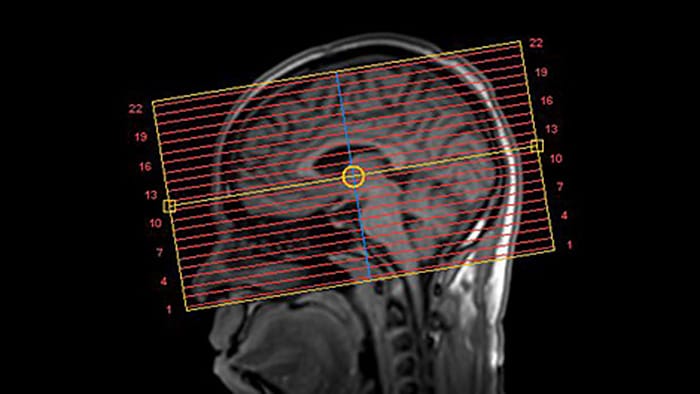
SmartExam
SmartExam automates MR exam planning, scanning and processing to deliver consistent and reproducible results – all with a single mouse click. SmartExam automates over 80% of the typical scanner caseload.
AI-enabled function or feature SmartExam uses intelligent software which automatically plans scanning geometries, based on the validated scanning preferences of the healthcare professional. This enables the healthcare professional to standardize the MRI exam process, enhancing consistency in follow-up exams of the same patient and from patient to patient. Validation process SmartExam algorithms for predicting and supporting workflow were validated using non-clinical performance testing with users. Ultimate decision responsibility Healthcare professionals remain in control of the MRI imaging, while SmartExam supports their workflow with automatically generated scanning geometries.
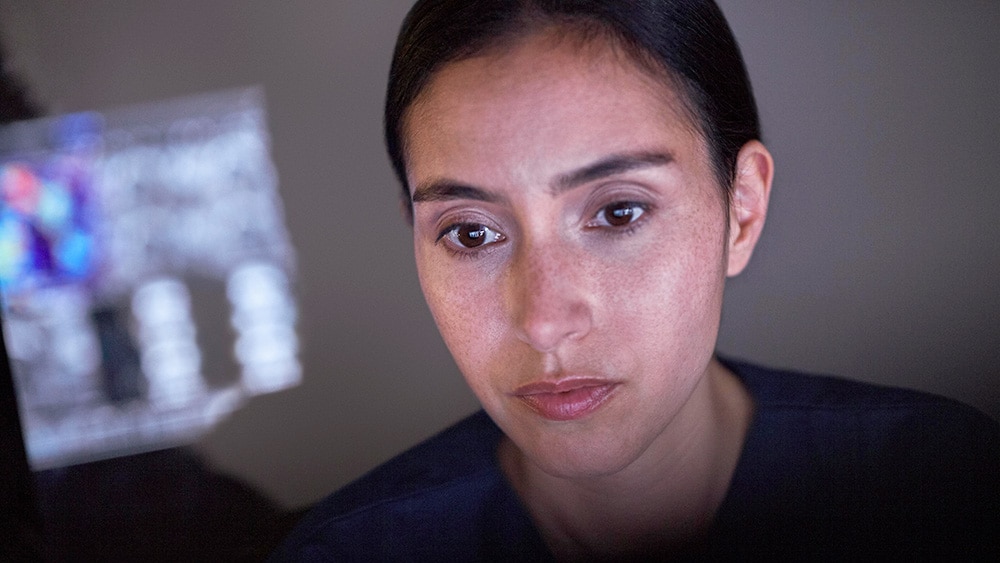
SmartSpeed
SmartSpeed is an AI-based imaging technology that leverages a unique Compressed-SENSE based deep learning AI algorithm to take speed and image quality to the next level for a large variety of patients. SmartSpeed increase imaging speed by up to a factor of 3*, provides up to 65% greater resolution* to deliver outstanding image quality, and is compatible with 97% of clinical protocols**.
AI-enabled function or feature The platform, which features an award-winning AI algorithm (Adaptive-CS-Net) applied directly at the source of the MR signal, advances Philips’ existing Compressed SENSE acceleration technology, further enhancing the ability to reconstruct a full image from under-sampled data while maintaining virtually equivalent image quality. Validation The neural network was trained for all contrasts and a wide range of acceleration factors, to ensure data consistency and signal fidelity. Ultimate decision responsibility Healthcare professionals remain in control of the MRI imaging, while SmartSpeed supports with speed and quality of image reconstruction.
* Compared to Philips SENSE
* 97% applicability on average, measured across a sample of sites from Philips MR installed base
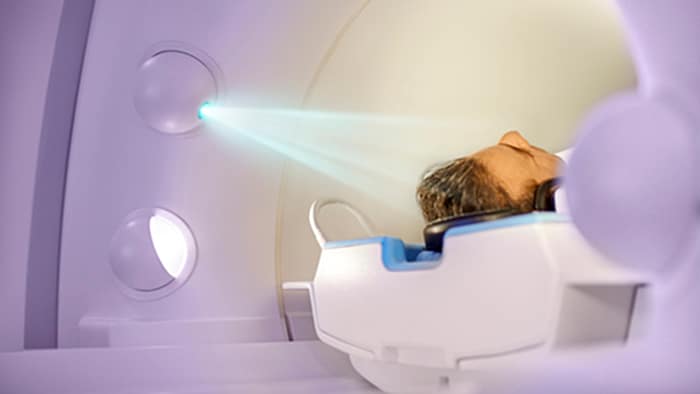
VitalEye
VitalEye allows for integrated automated breathing detection for a broad range of patient sizes without accessories or manual adjustments.
AI-enabled function or feature VitalEye uses touchless patient sensing and advanced algorithms to detect breathing – allowing routine MR exam set-up to occur in less than a minute, even for less experienced operators, while helping them keep a caring eye on the patient. Validation process VitalEye was validated against the (belt) device used today, demonstrating equivalent or superior performance. Ultimate decision responsibility Healthcare professionals remain in control of MRI imaging, while VitalEye detects the patient's breathing automatically.
Connected care
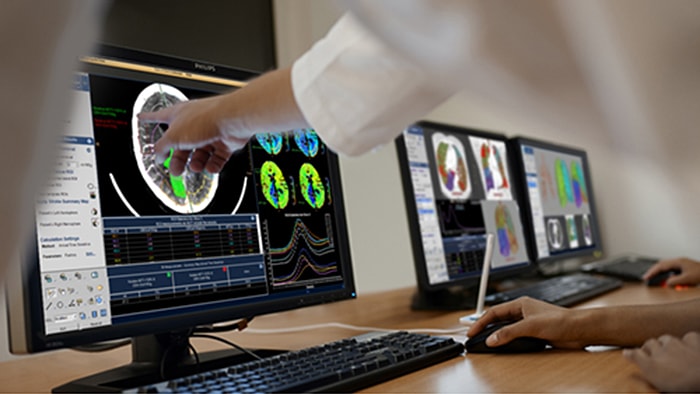
Advanced Visualization Workspace
Advanced Visualization Workspace is a comprehensive, advanced data integration, visualization, and analysis platform to enhance diagnostic confidence.
AI-enabled function or feature Advanced Visualization Workspace combines clinical data from various modalities using AI to enhance clinical workflows. The latest iteration features machine learning capabilities to automatically learn from prior application usage to predict the series and data type on which pre-processing should be applied. Validation process Verification and validation tests have been performed to address intended use, claims about technological characteristics, requirement specifications, and risk management results. Ultimate decision responsibility Healthcare professionals remain in control of diagnostic decision-making.
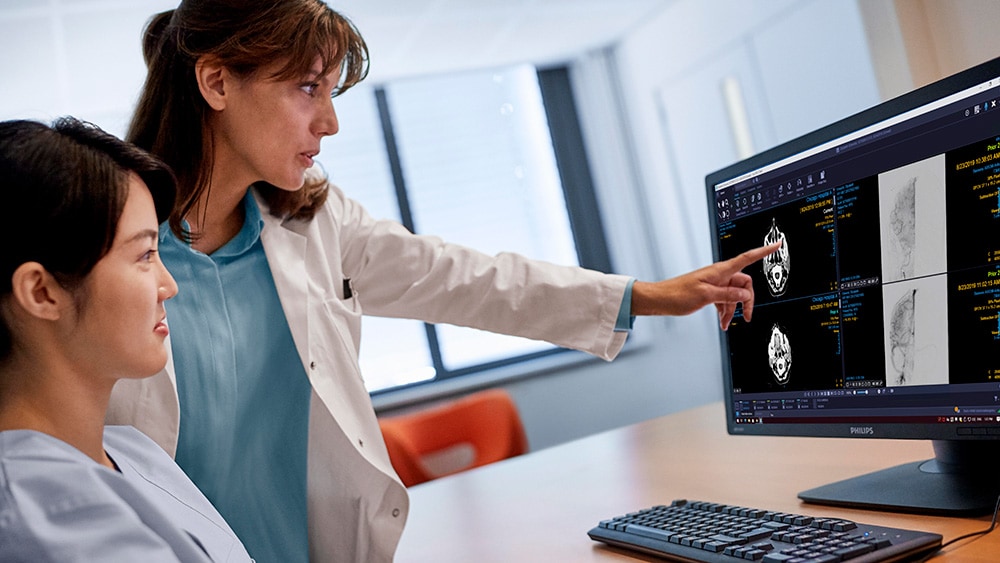
AI Manager
Philips AI manager is an end-to-end, cloud-based AI solution that offers radiology departments access to an ecosystem of AI applications from multiple vendors that can assist with diagnostic reading of images.
AI-enabled function or feature For an overview of existing and upcoming AI applications that are accessible via AI Manager, please contact a Philips sales representative. Validation process For all AI applications offered by third-party vendors the compatibility to AI Manager is validated, and existing regulatory clearances are reviewed. The regulatory responsibility remains with the legal manufacturer (i.e., third-party vendor). Ultimate decision responsibility The healthcare professional remains in control of diagnostic decision-making, with AI Manager providing supporting insights and information.
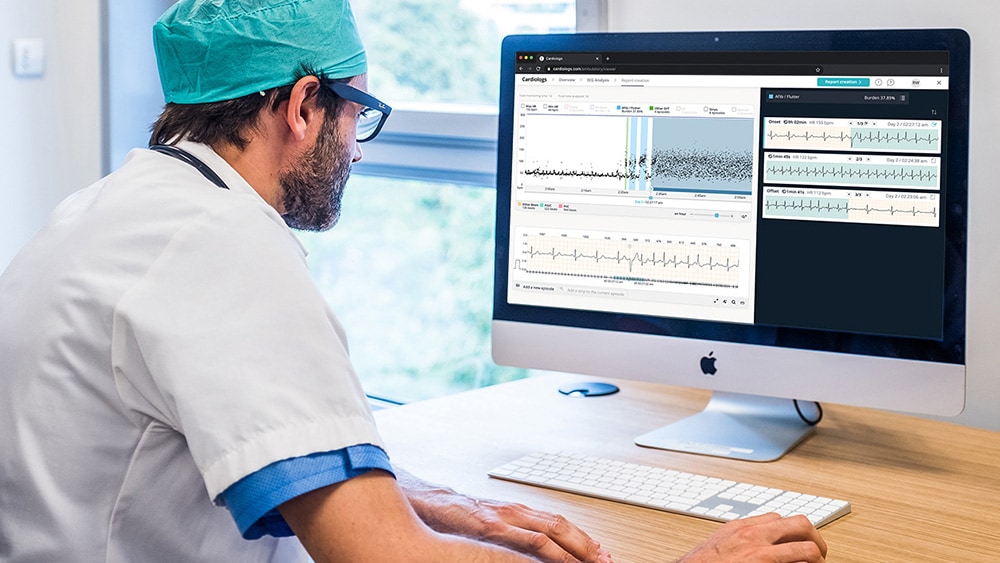
Cardiologs
Cardiologs is a unique arrhythmia diagnostic software that is cloud-based, vendor-neutral and powered by artificial intelligence to streamline ECG analysis. Its clinically-proven algorithm enables the detection of 20+ meaningful cardiac events and parameters including PVC morphology, QTc analysis, Heart Rate Variability (HRV), and heart rate trends to expand the breadth of the physician’s clinical interpretation.
AI-enabled function or feature ECG analysis algorithms traditionally rely on the RR interval only. Cardiologs leverages deep-learning technology to reliably capture the ventricular and atrial rhythms, analyzing the P wave like an expert would, making it much more specific than traditional software programs. Validation Built on a growing database of millions of ECG recordings, the Cardiologs AI algorithms have been validated in several peer-reviewed publications and abstracts. Ultimate decision responsibility The Cardiologs platform interpretation results are not intended to be the sole means of diagnosis. It is offered to physicians and clinicians on an advisory basis only in conjunction with the physician’s knowledge of ECG patterns, patient background, clinical history, symptoms, and other diagnostic information. The Cardiologs platform is a medical device intended for use by qualified healthcare professionals for the assessment of arrhythmias using ECG data in subjects over 18 years of age. Class II in the USA according to the 510K clearance.

Cardiorespiratory Signals (CReSS)
Philips CReSS is a component of Philips Somnolyzer sleep scoring software. CReSS provides sleep clinicians an apnea-hypopnea index (AHI) that is superior to the respiratory event index (REI) based on monitoring time.
AI-enabled function or feature DreamMapper correlates data on therapy usage and mask fit with apnea hypopnea index (AHI) readings to track and help improve treatment success by helping users set and achieve personal therapy goals. The app motivates people to take an active role in their treatment via algorithms derived from psychological theories of behavior change. Validation process DreamMapper was validated using non-clinical performance testing with users, using web and mobile automation tests across 30 countries and 20 languages, for both iOS and Android. In addition, manual testing was done for scenarios where automation cannot be used. Ultimate decision responsibility Consumers are presented with information and advice via an app and remain in control of their therapy.
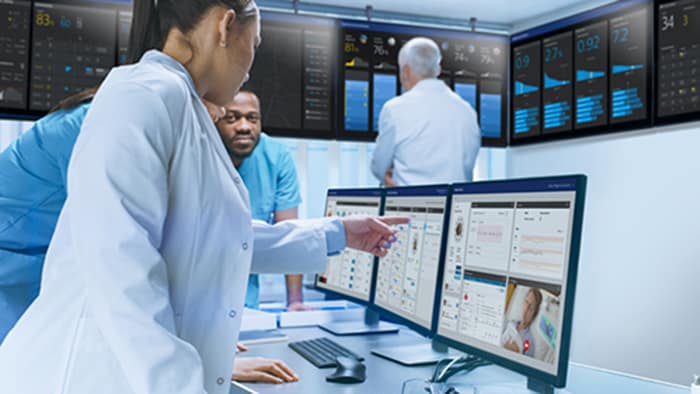
eCare Manager
eCareManager is a software platform that enables patient population management, provides actionable insights for clinical decision support, and supports care coordination.
AI-enabled function or features Validation process Ultimate decision responsibility
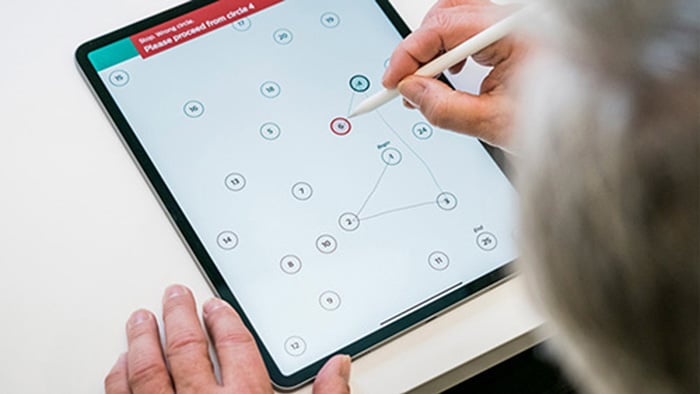
IntelliSpace Cognition
IntelliSpace Cognition is a proposition for neurologists to aid in assessing the cognition of their patients.
AI-enabled function or feature IntelliSpace Cognition uses automated scoring of tablet-based cognitive tests to help neurologists assess whether patients have cognitive deficits, speeding up the assessment and improving reproducibility. Validation process IntelliSpace Cognition scores were validated in a normative data study with a patient cohort that matched the target population in terms of gender, age, and ethnicity. Ultimate decision responsibility Healthcare professionals are presented with test scores that support their diagnostic decision-making.
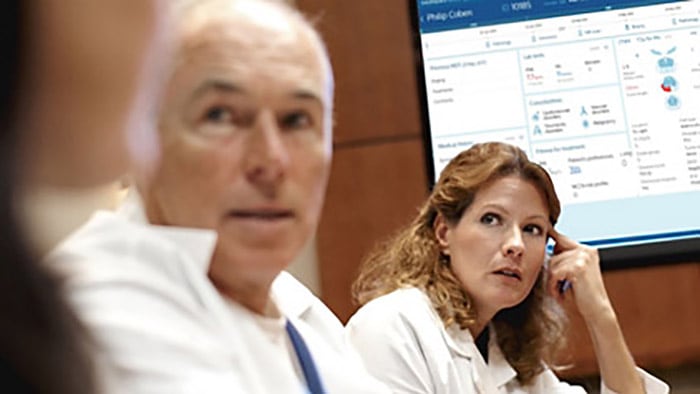
IntelliSpace Precision Medicine
IntelliSpace Precision Medicine is a cloud-based Software as a Service (SaaS) platform designed to enable comprehensive patient-centric cancer care. It provides service-based precision medicine applications with additional capabilities extensions by modules or options and enables capturing discrete clinical (onco)genomic data. It enables storage of variants, annotations, clinical interpretation and optional treatments.
AI-enabled function or feature IntelliSpace Precision Medicine intelligently integrates information across different clinical domains such as radiology, pathology, EHR systems, and genomics, and incorporates all key patient and medical data in one location, to provide a clear, intuitive view of patient status in its disease and state context. Validation process Software design verification and validation was performed as part of ongoing R&D efforts. Ultimate decision responsibility IntelliSpace Precision Medicine is an information management software only, and does not have the ability by itself to diagnose disease, prescribe treatment, or perform any other tasks that constitute the practice of medicine. The clinical information contained in IntelliSpace Precision Medicine is intended as a supplement to, and not a substitute for, the knowledge, expertise, skill, and judgement of physicians and other healthcare professionals involved with patient care. Healthcare professionals remain in control of the clinical/pathological assessment, diagnosis and therapy decision, while IntelliSpace Precision Medicine supports their workflow by integrating and providing relevant information.
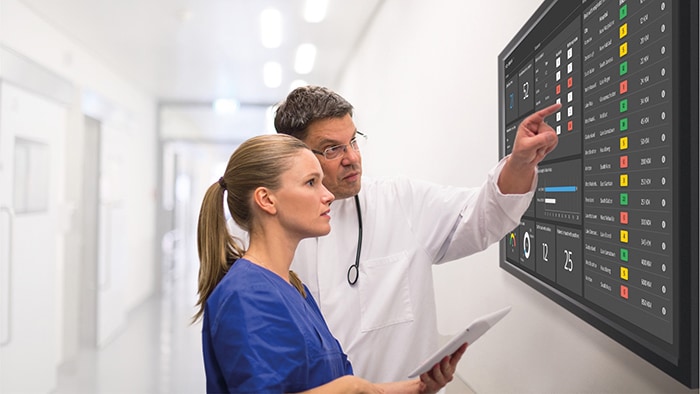
Patient Flow Capacity Suite
Patient Flow Capacity Suite is a cloud-based patient logistics management solution that helps improve care coordination and patient transitions by combining patient insights and resource requirements to enhance care delivery at the right time, place and setting.
AI-enabled function or features Patient Flow Capacity Suite features machine learning algorithms that help predict the risk of patient readmission within 30 days, and that help assess whether the patient is at risk of becoming unstable or ready to be reviewed for potential discharge. Validation process Ultimate decision responsibility
Algorithms were retrospectively developed based on historical data aggregated across multiple hospitals over a multi-year period.
Healthcare professionals remain in control of decisions about patient transfers and patient discharge, with Patient Flow Capacity Suite aiding their decision-making.
Image-guided therapy
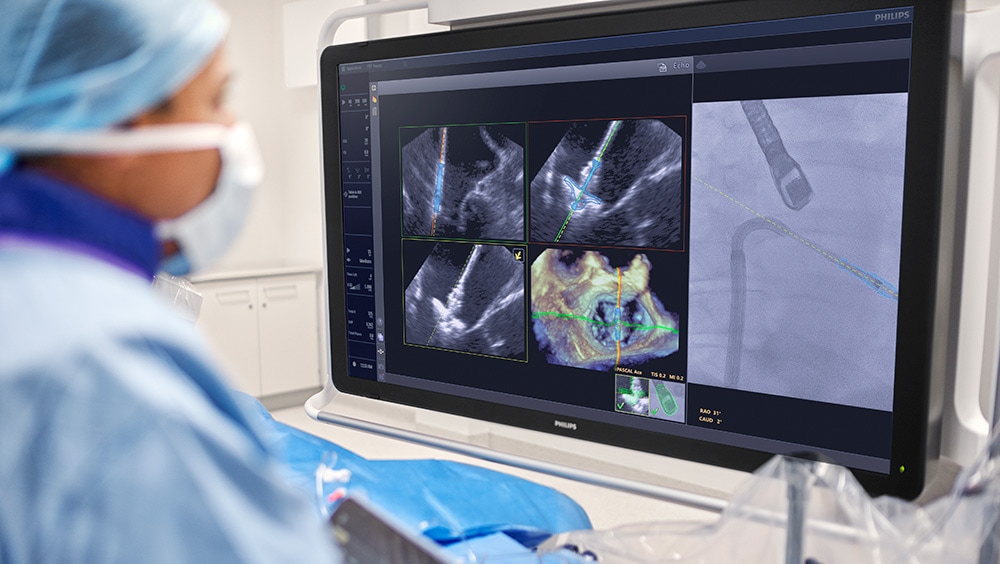
DeviceGuide
DeviceGuide is an AI-based device tracking solution in Philips EchoNavigator that assists heart teams during minimally invasive transcatheter mitral valve repair (M-TEER) procedures.
AI-enabled function or feature DeviceGuide uses deep-learning technology to automatically track and augment the therapy device in real time on live X-ray and Echo images. It keeps the therapy device visible as the device moves inside the beating heart and provides a clear visual reference of the anatomical target to help the heart team navigate confidently during the procedure. Validation process The AI functionality was trained and validated using data from more than one hundred TEER procedures on thousands of images of structural heart interventions performed in Europe and the United States. Validation included physician review and assessment of model performance under representative clinical workflow and imaging conditions. Ultimate decision responsibility DeviceGuide provides visual support only. Healthcare professionals remain responsible for interpreting images and making all procedural decisions.
Personal health

Lumea IPL 9900 Series with SkinAI
The Lumea IPL 9900 Series with SkinAI is an Intense Pulsed Light (IPL) hair removal device designed to remove unwanted hair, offering a uniquely personalized experience with its three new SkinAI features, accessible via the Lumea app.
AI-enabled function or feature The Lumea IPL 9900 Series with SkinAI includes three key AI features: the Skin-Selfie Analyzer (providing users an in-depth understanding of the user’s facial skin and sharing valuable insights and tips on how to improve skin health), Audio Flash Counter (giving real-time guidance on the coverage of the treatment area and offers tips to improve the user’s technique), and Body Hair Analyzer (allowing users can track their hair reduction in between IPL treatments so users can see their progress over time). Validation process The algorithm has been validated via recruited test subjects for the following metrics: radiance, texture, dark circles, smoothness, skin shine and firmness. Ultimate decision responsibility Consumers are presented with information and advice via an app and remain in control of their hair removal.

Philips Smart Shaver Series 7000, 8000 and 9000
Smart Shaver Series 7000, 8000 and 9000 are male grooming products enhanced with personal guidance that was co-developed with dermatologists and shaving experts, to help men getting the perfect results at every shave.
AI-enabled function or feature Smart Shaver Series 7000, 8000 and 9000 have built-in sensors that enable the device to detect the user's shaving motions, using AI. The system gives the consumer feedback on his data to improve his shaving effectiveness and to reduce skin irritation issues after shaving. Validation process The algorithm was trained on circle and stroke shaves with rotary shaving users. Steps included pre-processing the data from the shaver sensors (accelerometers), calculating the classifiers to be fed into the algorithm, and finally training the algorithm to detect circles from strokes. Ultimate decision responsibility Consumers receive personalized, real-time shaving guidance, they remain in control of the shaving.

Philips Sonicare DiamondClean Prestige 9900
Philips Sonicare DiamondClean Prestige 9900 is an electric power toothbrush that uses sensors to detect the cleaning motions that people use and the coverage they achieve. It pairs with a mobile app that allows people to better understand their brushing technique and take an active role in improving their oral health.
AI-enabled function or feature Philips Sonicare DiamondClean Prestige 9900 correlates data on electric power toothbrush motion to detect brushing location and techniques in the mouth and help improve brushing routines by informing users and offering actionable recommendations at the end of their brushing session. It also tracks patterns over time without the need to open the app during every brushing session. The app’s recommendations motivate people to improve their brushing based on psychological theories of positive behavior change. Validation process Philips Sonicare DiamondCLean Prestige 9900 AI was trained and verified using both motion tracking annotation and supervised learning. The combination of the AI algorithms and the brushing guidance was validated using non-clinical performance testing with users from the United States in English, for both iOS and Android. In addition, manual testing was done for scenarios where automation cannot be used. Ultimate decision responsibility Consumers are presented with information and advice via an app and remain in control of their brushing.

